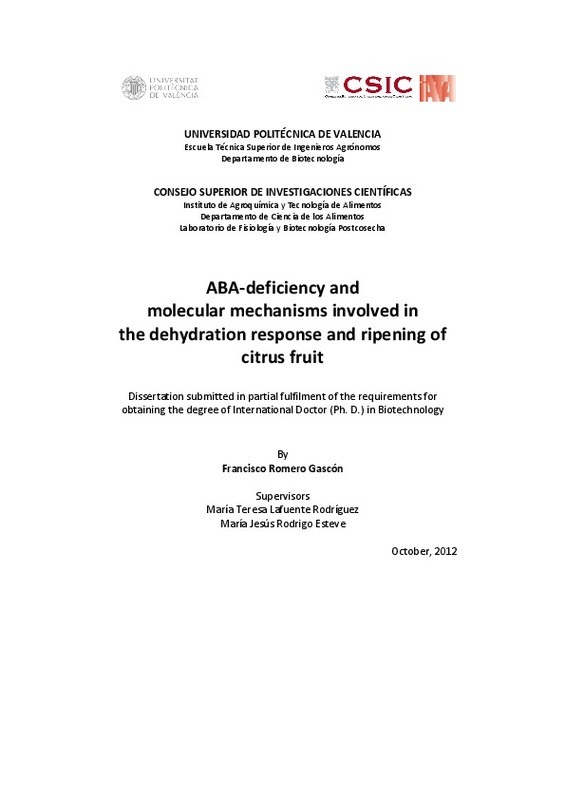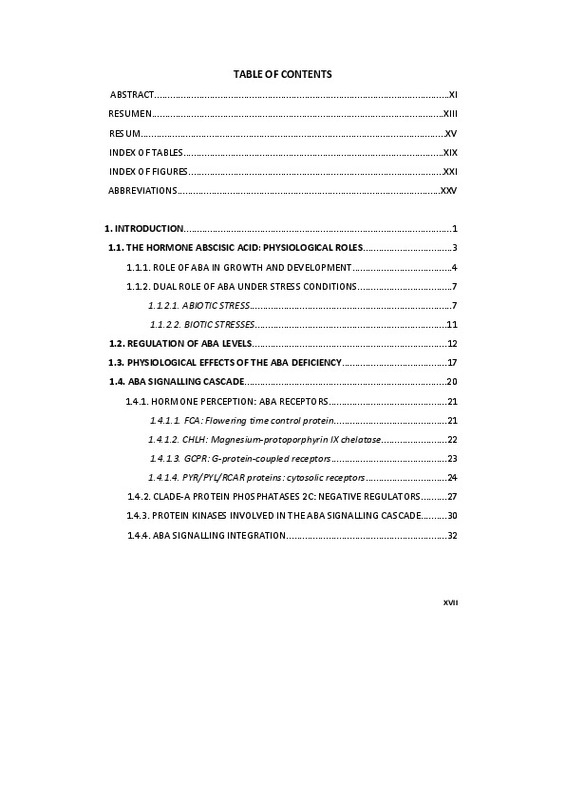- RiuNet repositorio UPV
- :
- Investigación
- :
- Tesis doctorales
- :
- Ver ítem
JavaScript is disabled for your browser. Some features of this site may not work without it.
Buscar en RiuNet
Listar
Mi cuenta
Estadísticas
Ayuda RiuNet
Admin. UPV
ABA-deficiency and molecular mechanisms involved in the dehydration response and ripening of citrus fruit
Mostrar el registro sencillo del ítem
Ficheros en el ítem
| dc.contributor.advisor | Lafuente Rodriguez, Teresa
|
es_ES |
| dc.contributor.advisor | Rodrigo Esteve, María Jesús
|
es_ES |
| dc.contributor.author | Romero Gascón, Francisco
|
es_ES |
| dc.date.accessioned | 2012-12-11T07:44:12Z | |
| dc.date.available | 2012-12-11T07:44:12Z | |
| dc.date.created | 2012-12-03T09:00:00Z | es_ES |
| dc.date.issued | 2012-12-11T07:44:04Z | es_ES |
| dc.identifier.uri | http://hdl.handle.net/10251/18105 | |
| dc.description.abstract | The aim of this work has been to unravel the influence of the phytohormone ABA in the molecular mechanisms underlying the postharvest dehydration response and the development and ripening of citrus fruit, taking advantage of the spontaneous fruit-specific ABA-deficient 'Pinalate' mutant, which is more prone to dehydration and to develop non-chilling peel pitting (NCPP) than its wild-type 'Navelate' orange. A comparative transcriptomic analysis highlighted the ability of parental fruit to induce early molecular responses aimed to reduce water loss and its detrimental effects. ABA application to mutant fruit modulated relevant transcriptomic changes but did not substantially modify either dehydration rate or NCPP incidence, which suggested that 'Pinalate' mutant could be insensitive to ABA. Therefore, the ABA perception system components in Citrus were identified and their regulation under developmental and stressful conditions was investigated. Minor differences between varieties were found in the CsPYR/PYL/RCAR ABA receptors and the CsSnRK2s downstream protein kinases transcript levels, whereas CsPP2CAs negative regulators accumulation was lower in the mutant fruit. ABA receptors and CsSnRK2s gene expression patterns depended on the tissue, the stress severity and the source of the ABA signal from a developmental or stressful stimulus, whilst CsPP2CAs displayed a consistent pattern. Overall, this work suggest that the ABA-deficient 'Pinalate' fruit may sense ABA although the hormone signal could be impaired because reduced CsPP2CAs levels causing altered water stress response and higher NCPP susceptibility. | es_ES |
| dc.language | Inglés | es_ES |
| dc.publisher | Universitat Politècnica de València | es_ES |
| dc.rights | Reserva de todos los derechos | es_ES |
| dc.source | Riunet | es_ES |
| dc.subject | Fruto | es_ES |
| dc.subject | Postcosecha | es_ES |
| dc.subject | Ácido abscísico | es_ES |
| dc.subject | Deshidratación | es_ES |
| dc.subject | Señalización | es_ES |
| dc.title | ABA-deficiency and molecular mechanisms involved in the dehydration response and ripening of citrus fruit | |
| dc.type | Tesis doctoral | es_ES |
| dc.identifier.doi | 10.4995/Thesis/10251/18105 | es_ES |
| dc.rights.accessRights | Abierto | es_ES |
| dc.contributor.affiliation | Universitat Politècnica de València. Departamento de Biotecnología - Departament de Biotecnologia | es_ES |
| dc.description.bibliographicCitation | Romero Gascón, F. (2012). ABA-deficiency and molecular mechanisms involved in the dehydration response and ripening of citrus fruit [Tesis doctoral no publicada]. Universitat Politècnica de València. https://doi.org/10.4995/Thesis/10251/18105 | es_ES |
| dc.description.accrualMethod | Palancia | es_ES |
| dc.type.version | info:eu-repo/semantics/acceptedVersion | es_ES |
| dc.relation.tesis | 3996 | es_ES |
Este ítem aparece en la(s) siguiente(s) colección(ones)
-
Tesis doctorales [5214]







![Text file [Text]](/themes/UPV/images/text.png)


